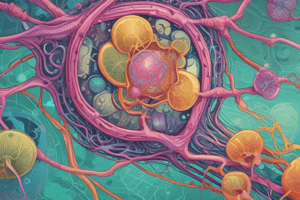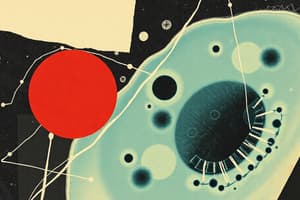Podcast
Questions and Answers
What is the primary function of the lysosomes in a cell?
What is the primary function of the lysosomes in a cell?
- To regulate what enters and leaves the cell
- To break down waste and foreign substances (correct)
- To generate energy for the cell through cellular respiration
- To synthesize proteins
During photosynthesis, what is the role of light absorption?
During photosynthesis, what is the role of light absorption?
- To produce glucose
- To release oxygen
- To synthesize proteins
- To absorb light energy by pigments (correct)
Which part of the nervous system integrates and processes information?
Which part of the nervous system integrates and processes information?
- Respiratory System
- Peripheral Nervous System (PNS)
- Circulatory System
- Central Nervous System (CNS) (correct)
Which organelle contains the DNA and controls cell growth and reproduction?
Which organelle contains the DNA and controls cell growth and reproduction?
Which of Mendel's Laws states that alleles for different genes are sorted independently?
Which of Mendel's Laws states that alleles for different genes are sorted independently?
What is the function of the Endoplasmic Reticulum (ER)?
What is the function of the Endoplasmic Reticulum (ER)?
Which stage of photosynthesis involves the conversion of light energy into ATP and NADPH?
Which stage of photosynthesis involves the conversion of light energy into ATP and NADPH?
What is the primary function of decomposers in an ecosystem?
What is the primary function of decomposers in an ecosystem?
What is the term for the genetic makeup of an individual?
What is the term for the genetic makeup of an individual?
What is the primary role of producers in an ecosystem?
What is the primary role of producers in an ecosystem?
Flashcards are hidden until you start studying
Study Notes
Cell Structure
- Cell Membrane: semi-permeable, regulates what enters and leaves the cell
- Cytoplasm: jelly-like substance inside the cell membrane, contains organelles
- Organelles:
- Nucleus: contains DNA, controls cell growth and reproduction
- Mitochondria: generates energy for the cell through cellular respiration
- Endoplasmic Reticulum (ER): transports proteins and lipids
- Ribosomes: site of protein synthesis
- Lysosomes: contains digestive enzymes, breaks down waste and foreign substances
- Golgi Apparatus: modifies and packages proteins and lipids for transport
Human Physiology
- Nervous System:
- Central Nervous System (CNS): brain and spinal cord, integrates and processes information
- Peripheral Nervous System (PNS): nerves, transmits information to and from CNS
- Circulatory System:
- Heart: pumps blood throughout the body
- Blood Vessels: arteries, veins, and capillaries, transport oxygen and nutrients
- Respiratory System:
- Lungs: exchange oxygen and carbon dioxide
- Trachea: airway that leads to the lungs
- Digestive System:
- Mouth: begins mechanical and chemical digestion
- Stomach: mixes food with digestive enzymes
- Small Intestine: absorbs nutrients into the bloodstream
- Large Intestine: absorbs water and electrolytes, stores waste
Photosynthesis
- Light-Dependent Reactions:
- Light Absorption: light energy is absorbed by pigments (e.g. chlorophyll)
- Electron Transport: light energy is converted into ATP and NADPH
- Light-Independent Reactions (Calvin Cycle):
- Carbon Fixation: CO2 is fixed into a 3-carbon molecule
- Reduction Reactions: 3-carbon molecule is reduced to form glucose
- Overall Equation: 6 CO2 + 6 H2O + light energy → C6H12O6 (glucose) + 6 O2
Genetics
- Mendel's Laws:
- Law of Segregation: each pair of alleles separates during gamete formation
- Law of Independent Assortment: alleles for different genes are sorted independently
- Law of Dominance: dominant alleles are expressed over recessive alleles
- DNA Structure:
- Double Helix: two complementary strands of nucleotides
- Nucleotides: composed of sugar, phosphate, and nitrogenous bases
- Genotype: genetic makeup of an individual
- Phenotype: physical expression of an individual's genotype
Ecosystems
- Biotic Factors: living components of an ecosystem (e.g. plants, animals, microorganisms)
- Abiotic Factors: non-living components of an ecosystem (e.g. water, sunlight, temperature)
- Energy Flow:
- Producers: organisms that convert sunlight into energy (e.g. plants)
- Consumers: organisms that obtain energy by consuming other organisms
- Decomposers: organisms that break down organic matter
- Food Webs: complex networks of energy flow through an ecosystem
NCERT
- NCERT Books: textbooks published by the National Council of Educational Research and Training (India)
- Biology Curriculum: covers topics such as cell structure, genetics, evolution, and ecology
- Importance: provides a comprehensive and standardized education in biology for students in India
Studying That Suits You
Use AI to generate personalized quizzes and flashcards to suit your learning preferences.




